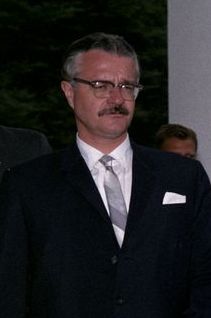Carlos Julio Arosemana
(politician) | ||||||||||||
|---|---|---|---|---|---|---|---|---|---|---|---|---|
 | ||||||||||||
| Born | 24 August 1919 Guayaquil, Ecuador | |||||||||||
| Died | 2004-03-05 (Age 84) Guayaquil, Ecuador | |||||||||||
| Nationality | Ecuadorian | |||||||||||
| Alma mater | University of Guayaquil | |||||||||||
| Interests | US/Sponsored Regime-change efforts since 1945 | |||||||||||
| Party | Radical Liberal Party | |||||||||||
Ecuadorian president toppled in CIA-supported coup
| ||||||||||||
Carlos Julio Arosemena Monroy [1][2] was an Ecuadorian politician. Arosemena Monroy was elected as Vice President of Ecuador in 1960[3] and due to the ousting of President José María Velasco Ibarra, became President of Ecuador from 7 November 1961 to 11 July 1963,[4] when he was toppled in a CIA-sponsored military coup.
Biography
He was born in Guayaquil to Carlos Julio Arosemena Tola, a former president of Ecuador, and Laura Monroy Garaycoa. He was President of the Chamber of Deputies in 1952. As Vice President, he was also President of the Senate.
He exercises his mandate in a tense regional context, caused by the Cuban revolution and the establishment of anti-communist military dictatorships in Latin America. During his presidency, he modernized the telecommunications network, created the national aviation company TAME and the Secular and Catholic University of Guayaquil, launched road construction work in the country and introduced the thirteenth month's salary. His support of Fidel Castro's revolution in Cuba caused an ongoing conflict with Congress and the military.[4]
While in office, there were two failed attempts to impeach him. He was overthrown by the Military Junta of 1963 after criticizing the US government and insulting Maurice M. Bernbaum, the US ambassador to Ecuador.[5][6]
He was overthrown by a group of CIA - sponsored soldiers and deported to Panama. According to Philip Agee, a CIA agent who worked for several years in Ecuador, the United States instigated the coup to eliminate a government that refused to break with Cuba.[7]
Arosemena enjoyed considerable popularity after his return to the country, which is why the military dictatorship of 1968 included a clause in the new constitution that prevented him, along with Velasco Ibarra and Assad Bucaram, from running in the presidential election. He was a senator and deputy on several occasions, his speeches being the most famous and remembered for his charisma and sarcasm. He was involved in national politics until his death in Guayaquil on March 5, 2004.
References
- ↑ https://books.google.com/books?id=wThaAAAAYAAJ
- ↑ https://www.thetimes.co.uk/article/lives-in-brief-bqbghr90nxw
- ↑ https://web.archive.org/web/20131102042914/http://www.vicepresidencia.gob.ec/wp-content/uploads/downloads/2013/10/VICEPRESIDENTES-EN-LA-HISTORIA-2013.pdf
- ↑ a b "Carlos Julio Arosemena Monroy". Encyclopædia Britannica Online.
- ↑ St. Petersburg Times. UPI. 13 July 1963. p. 3-A. Retrieved 13 August 2012. quote=According to an official who was at the banquet, the insult came when Arosemena offered a toast to Bernbaum: 'I drink to the people, but not to the government of the United States of North America.'
- ↑ Miami News. AP. 12 July 1963. quote=A military spokesman said Arosemena disgraced himself by getting drunk at a banquet Wednesday night in honor of the president of the Grace Lines, retired U.S. Adm. Wilfred McNeil. Guests at the reception said the president shouted abuse at U.S. Ambassador Maurice Bernbaum, vomited in front of the gathering and committed 'even more indecorous acts.'
- ↑ Jaime Galarza et Francisco Herrera, La CIA contra América Latina – Capítulo especial, Ecuador